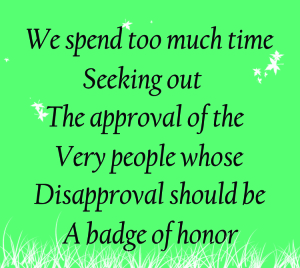 It is a difficult thing, dealing with people who hurt others so casually that they don’t even remember the things they have done (or perhaps they do remember and just don’t care enough to admit it) but, like many things in life, their cruelty is absolutely out of our control.
It is a difficult thing, dealing with people who hurt others so casually that they don’t even remember the things they have done (or perhaps they do remember and just don’t care enough to admit it) but, like many things in life, their cruelty is absolutely out of our control.
I see people on a regular basis, struggling for significance in the eyes of people who have absolutely no desire to love them, validate them, or even be decent to them. And that was me, for many years, so I do absolutely understand the need for approval. So what changed? I took a good hard look at the people who do this, the ones who I called “runaway freight trains” in my last blog post, and started asking myself:
“Great googly moogly, why on earth would I want the approval of anyone who is so casually callous?”
And more importantly, “Why would I want to continue to give this person free reign to marginalize me in this game of theirs that only they determine the rules of?”
The truth is that too often we willingly place our mental health into the hands of liars, manipulators and people who just generally have no conscience left.
You have to know me, I can still remember the three really cruel things I did to people in elementary school. I don’t hurt people so casually that I forget about it, and that is an excellent thing (even though I used to see it as a curse) because it keeps me from speaking my opinions, doing whatever it is I want to do, and lashing out every time I get in the flesh. It isn’t that I don’t still do those things from time to time, but my conscience tortures me afterward. I simply cannot imagine hurting someone and forgetting it – unless I said something that was taken the wrong way and the person didn’t tell me, but that isn’t really forgetting, that is just not realizing what I did to hurt someone. (Which is why it is good to confront people when they seem to say something out of character, because we all say idiotic things from time to time that sounded better in our heads)
But not everyone is like that and in fact for many people, the feelings of others don’t even register as an afterthought because they are utterly irrelevant. Oftentimes this happens when a person is so assured that they are right, and in right standing, that they do not question themselves or their actions – like King Saul. And there is nothing that anyone can do to change that. Some people enjoy being self-satisfied, so confident in their rightness that they are not even willing to question themselves in private — or perhaps they did long ago but decided to push away their doubts, searing their consciences to the point where they really are no longer able to see or care about their wrongs. If this is the case, then the person is no longer even worth our pity, and certainly not our continued support, and definitely not worth being in contact with! After all, they have ammunition, and they have diligently trained themselves to fire it off — do we really owe it to them to stand close enough to make it easy?
Unless we are small children, a relationship with this sort of person really is our own choice, and we have the power to step out of it. But the first step is giving up the fight to make ourselves more lovable to that person, because wanting their love, their approval or their repentance puts them in the position of having authority over our peace and happiness. It is tantamount to knowingly submitting to a wicked tyrant and trying to win him over by playing the game by his rules. Unfortunately, people like this have no respect for those who not only willingly play their game, but who also allow them to win every time! They merely tolerate the person, who has become nothing more than an outlet for their continued cruelty. Loving a person is different than trying to gain their love. We are required to love, but nowhere does scripture tell us to go out and win someone at any cost – it is a pursuit rooted in selfishness. Yes, even when it is simply a child desperately wanting the love their parent refuses to give, not selfish in terms of being evil or malicious, but simply centered in meeting one’s own needs. In this life, we oftentimes have to go without those things we desire, and sometimes we don’t get what we need because the only person who can give it refuses to do so.
Just think about it – say you are in a church with a pastor like this, or an adult child of a parent like this. A parishoner can always walk away from the abuse, just as an adult can walk away from a parent – but when the parishoner stays, they are giving their approval that leadership should function in this way, and when the adult goes back under the authority of an abusive parent, they also are giving their consent to the abuse. Tell me, why on earth would an abuser stop abusing when the object of their abuse gives them permission and opportunity to do so? If the abuser is callous enough to hurt people without caring, why would they see this situation as anything other than confirmation that they are right? As long as people stay and tolerate it, the abuser is going to feel as though they are in the right and justified to continue (that being said, if everyone leaves, they might simply say that it is the devil attacking them, but you can’t do anything about people’s delusions – such people who are callous about the feelings of others are generally hypersensitive about themselves to the point of paranoia, which is why they attract enablers around them to feel misplaced sympathy).
The truth is, that as much as we would love for the person to see our patience and kindness and respond by feeling badly about what they are doing, we give them no reason to question themselves (even if they wanted to). Our patience and kindness generally amounts to enablement, and turning a blind eye while others are abused by this same person. It is a bad enough thing to quietly tolerate our own abuse, but to ignore the cries of others? This is when we become oppressors by proxy, why? Just to get the abuser to be nice to us. That is too high a price tag for approval.
The epistles tell us repeatedly that the leaders of the church (and by extension, parents and bosses and really all leaders) are to be our example for godly behavior, that we should in fact imitate them. But what do we do when their behavior should not be imitated? Do we stay and give our silent approval? Do we have the right, with our continued presence, to send a message to others that this is in fact the way a leader should treat the Body of Messiah? Brethren, there are a great many ways to bring the Name of God to vain in this world, and one of the worst ways we do it is by behaving abusively or following those who do. We do not have the right to drag the Name of God through the dirt by following evil, arrogant men and women who slaughter the flock and don’t even look back, or remember. Until we start caring more about the reputation of our King than we do about getting along with those who have no desire to love, we will continue to do violence to His Word and His character.
People don’t change behavior that is coddled and encouraged – why should they?
In closing I will say this, we are going to be rejected and abused in this life and we have to learn to expect it, but before we go feeling betrayed and wounded we need to take a good hard look at who it is who is hurting us. Is that person good or evil, are they an encourager or someone who ignores everything good you do and only harps on the mistakes? Is the person only ever present in any real way when the opportunity is there to humiliate you? Are they only kind to you when you approve of the evil they do to others? Are they volatile? Can their favor be bought with money? Is this person the same in private as in public? Do they hold their loved ones to different standards than they hold you to? If the person who has done evil to you is evil, then rejoice. You do not want the approval of that type of person, because the approval of an evil person is generally only given if they see some evil in you to approve of. Their disapproval speaks more highly of you than their approval ever would anyway.
The truth is, that we spend far too much time seeking the approval of the very people whose disapproval should be a badge of honor.




















